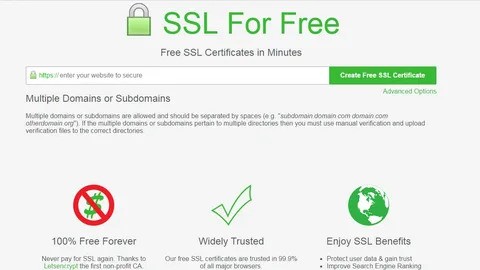Free SSL for Your Website
If you’re building a website in 2025, SSL isn’t optional — it’s essential. Whether you’re running a personal blog or an eCommerce store, if your site doesn’t show “https://” in the URL, you’re basically telling your visitors:
“This site might not be safe. Proceed at your own risk.”
Bad idea.
But here’s the good news:
You don’t need to pay for SSL certificates anymore. Several legit tools now offer 100% free SSL — no strings, no trials, no forced upgrades.
In this guide, you’ll learn:
-
What SSL is and why it matters
-
The 5 best free SSL providers (ranked and reviewed)
-
How to install SSL on your site (even without cPanel)
-
Common mistakes to avoid when using free SSL
-
Which free SSL works with WordPress, GitHub Pages, Cloudflare, Vercel, and others
Let’s secure your website — without spending a single dollar.
🔐 What is SSL and Why Do You Need It?
SSL (Secure Sockets Layer) encrypts the data transferred between your website and its visitors. When SSL is active, your site URL changes from http:// to https:// and shows a padlock icon in the browser.
✅ Benefits of SSL:
-
Security: Encrypts passwords, credit card info, and contact forms.
-
SEO Boost: Google favors HTTPS in rankings.
-
Trust: Users are more likely to engage and buy from secure sites.
-
Browser Requirements: Chrome and Firefox now block or warn users when a site doesn’t have SSL.
🚨 But Wait — Aren’t SSL Certificates Expensive?
They can be.
Traditional providers like GoDaddy, DigiCert, or GlobalSign charge anywhere from $50 to $300+ per year — per domain.
That’s overkill for:
-
New blogs
-
Portfolio sites
-
Test projects
-
MVP startups
-
Landing pages
That’s where free SSL tools come in.
🏆 Top 5 Free SSL Providers That Actually Work in 2025
Here are the best free SSL tools that are:
-
Legit
-
Actively maintained
-
Supported by modern browsers
-
Not forcing hidden paid upgrades
1. Let’s Encrypt
Best For: Most websites (especially WordPress, cPanel, Linux-based hosting)
Website: https://letsencrypt.org
Let’s Encrypt is a nonprofit backed by Mozilla, Google, and EFF. It provides free, browser-trusted SSL certificates via automation tools like Certbot.
🔧 Features:
-
Completely free
-
Auto-renew every 90 days
-
Works on shared, VPS, or dedicated hosting
-
Fully supported by most hosting companies
-
Wildcard SSL available (with DNS validation)
🧠 How to Use:
-
Via Certbot on Linux (easy if you’re using Apache/Nginx)
-
Or enabled in cPanel by your host (many have 1-click Let’s Encrypt SSL)
✅ Pros:
-
The most trusted and universal free SSL
-
Works on 99.9% of hosting platforms
❌ Cons:
-
Needs some technical skill on VPS or custom setups
2. Cloudflare Free SSL
Best For: Static sites, JAMstack apps, WordPress users, or non-coders
Website: https://www.cloudflare.com/ssl
Cloudflare offers proxy-based SSL that sits between your site and users. Even if your host doesn’t have SSL, Cloudflare can encrypt the traffic.
🔧 Features:
-
Instantly add HTTPS to any site
-
Works with any domain registrar
-
Doesn’t require server access
-
Free plan includes DNS, CDN, and DDoS protection
🧠 How to Use:
-
Sign up at Cloudflare and add your domain
-
Update nameservers to point to Cloudflare
-
Go to SSL/TLS > Select “Full” mode (not Flexible)
-
Enable “Always Use HTTPS”
✅ Pros:
-
Super easy, even for non-techies
-
Includes CDN and speed boost
-
Free wildcard SSL
❌ Cons:
-
Doesn’t encrypt data between Cloudflare and your server (unless server-side SSL is installed too)
3. ZeroSSL
Best For: Developers who want a free alternative to Let’s Encrypt
Website: https://zerossl.com
ZeroSSL is a Let’s Encrypt competitor offering free 90-day certificates. Unlike Let’s Encrypt, you can generate certs right from your browser — no command line needed.
🔧 Features:
-
Free DV SSL with 90-day validity
-
Online certificate wizard
-
Works with cPanel, Apache, Nginx
-
API access for automation
🧠 How to Use:
-
Go to website, sign up, and follow wizard to generate cert
-
Upload cert/key manually via your host or server
✅ Pros:
-
Easy manual setup
-
Trusted by browsers
-
Works with shared hosting
❌ Cons:
-
Only 3 free certificates per 90 days (unless you upgrade)
4. SSL For Free (Now part of ZeroSSL)
Best For: Manual SSL installs without coding
Website: https://www.sslforfree.com
Same backend as ZeroSSL but simplified for non-tech users.
🔧 Features:
-
Create and renew free SSL certs manually
-
Step-by-step guides for Apache, Nginx, and cPanel
✅ Pros:
-
No software install required
-
Good for learning how SSL works
❌ Cons:
-
Manual renewal every 90 days unless automated
5. GitHub Pages (Auto SSL Built-In)
Best For: Developers, portfolios, static sites
Website: https://pages.github.com
If you’re hosting your site on GitHub Pages, you get free HTTPS with no setup required.
🔧 Features:
-
Free SSL for your
github.iodomain -
Auto-renewed by GitHub
-
Works with custom domains too
🧠 How to Use:
-
Push your site to a GitHub repository
-
Enable GitHub Pages in the repo settings
-
Set your custom domain if needed
-
GitHub issues and maintains the SSL cert
✅ Pros:
-
100% automatic
-
Rock-solid reliability
-
Great for developers
❌ Cons:
-
Only supports static HTML/CSS/JS — no PHP or databases
📦 Bonus Mentions
If you’re hosting on any of the following platforms, they also include free SSL:
-
Netlify – great for frontend apps
-
Vercel – ideal for React/Next.js sites
-
Render – static and dynamic hosting
-
Firebase Hosting – for PWAs and apps
-
Hostinger (even on cheap paid plans)
🔧 How to Install Free SSL on Your Website
Here’s a basic breakdown by platform:
| Platform | Best SSL Option | Notes |
|---|---|---|
| WordPress on Shared Hosting | Let’s Encrypt / ZeroSSL | Use cPanel or hosting dashboard |
| WordPress.com Free Site | Built-in | No control or custom SSL |
| Static HTML site | Cloudflare / ZeroSSL | Use DNS + manual cert |
| GitHub Pages | Built-in SSL | Automatically issued |
| Custom VPS (Linux) | Let’s Encrypt with Certbot | Full control, but technical |
| Blogger / Wix / Weebly | Built-in | Limited customization |
🧠 SEO Tip: Add HTTPS ASAP
Google Chrome labels non-HTTPS sites as “Not Secure”, and it affects:
-
Your bounce rate (people leave fast)
-
Conversion rate (forms, carts, trust)
-
SEO rankings (HTTPS is a confirmed ranking factor)
High CPC keywords like:
-
“Best free SSL for WordPress”
-
“Free HTTPS for blog”
-
“Cheap domain with SSL”
-
“Free SSL hosting”
-
“Secure website certificate free”
are highly competitive because SSL is essential to making money online.
If you’re planning to:
-
Run AdSense
-
Sell products
-
Collect leads
You need SSL from day one.
🧱 Common Mistakes to Avoid with Free SSL
-
Using Flexible SSL on WordPress (with Cloudflare) – causes redirect loops
-
Not renewing 90-day certs (Let’s Encrypt, ZeroSSL)
-
Installing SSL but not forcing HTTPS
-
Mixing HTTP and HTTPS content – causes security warnings
-
Forgetting to update Google Search Console to new HTTPS URLs
🧭 Final Verdict: Which Free SSL Should You Use?
| Use Case | Best Option |
|---|---|
| General Website (WordPress or static) | Let’s Encrypt |
| Portfolio on GitHub | GitHub Pages |
| No coding / beginner | Cloudflare |
| You want full control | ZeroSSL or Certbot |
| JAMstack or frontend apps | Vercel / Netlify |



